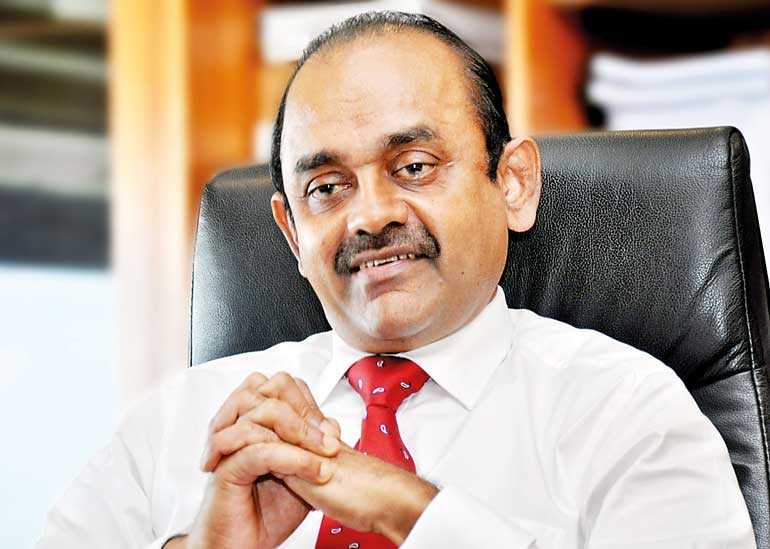Monday Feb 16, 2026
Monday Feb 16, 2026
Tuesday, 8 September 2020 00:01 - - {{hitsCtrl.values.hits}}

Sujeewa Rajapakse - Pic by Lasantha Kumara
While CEOs and leaders focus on the future, we’re asking them to pause, reflect on the past, and share the single-most important lesson they have learned.
Our lives and careers are works-in-progress, and we will always learn more in the future than we know now, but what insights could our younger selves – and other aspiring leaders – embrace and act on right now to live a more positive, productive, and empowered life?
Today, Michel Nugawela asks Sujeewa Rajapakse, Chairman, People’s Bank, what one piece of advice he would give his younger self if he could travel back in time:
 My advice to my younger self and aspiring leaders: Become indispensable. Ask yourself – What is my responsibility, what must I do, and how can I achieve the corporate objectives of the place in which I work? Develop qualitative and quantitative targets, and drive yourself to achieve them. People will come to respect you for the work you do to better the organisation.
My advice to my younger self and aspiring leaders: Become indispensable. Ask yourself – What is my responsibility, what must I do, and how can I achieve the corporate objectives of the place in which I work? Develop qualitative and quantitative targets, and drive yourself to achieve them. People will come to respect you for the work you do to better the organisation.
Being indispensable doesn’t mean that you become a bottleneck in the process, which results in others being unable to do their work. It also doesn’t mean that you work for an individual rather than an organisation. If you do that, you will be myopic and lack focus. You must always drive the vision and become a major contributor to your organisation. That’s the pivotal role you should play.
It’s the role I play today and have played in the past. Looking back, whether at school or in my career – I became indispensable. I made sure that, for anything and everything, people looked to Sujeewa Rajapakse.
I hail from an agricultural family in Matara. My father was a farmer who owned a few small businesses. I consider my parents to be visionaries because they realised how important it was for their children to have the best education, even though they lacked one. Thanks to their foresight, my brother and I were educated at Richmond, my other brothers at Ananda and Matara Rahula, and my sister at Galle Sangamiththa.
At that time Richmond was dominated by elite families and I soon became aware that I lacked certain skills because of my background. But I was patient and eventually my potential was recognised when I was made a class monitor. That was the humble beginning of my journey.
When I came to Colombo in 1983, I found the culture very different to that of Galle or Matara. The firm I worked at as an audit trainee had England and Wales-qualified chartered accountants who only spoke English. In order to improve my English, I followed a very rigorous course at Aquinas College. That was my turning point. Life became easier. I now had the vocabulary.
However, there were other challenges. The Colombo elite who dominated the firms at the time kept promotions and recognition to themselves. They would never have considered promoting me at that time. I won’t say they ill-treated people, but they treated different people in different ways. It was a nightmare for someone like me who came from a totally different background.
I would say the biggest challenge I faced was breaking my negative mindset. I was nervous about what I thought be my own drawbacks – my family background and thinking I was backward. But then I realised it was all in my mind. If I wanted to become a specialist rather than a generalist and climb the ladder to become a leader, then I would have to break that negativity.
My advice to my younger self: If you want to climb the ladder and become a leader, break your negative mindset. Focus on your core competencies and drive with your strengths, while you manage your weaknesses.
So I asked myself how I could contribute to the development of the practice. I was determined to establish myself. I observed, studied and learnt from the senior partners in our firm. I became indispensable.
I also began thinking about the leadership skills I would need to equip myself with. The leaders at the firm were basically bookworms who sat behind their desks expecting clients to come to them. They never promoted themselves or the firm. They were hard workers with a hard skill set, not smart workers.
But if you want to be indispensable and become a smart leader, you need to develop your interpersonal skills – your time management, your attire, your emotional intelligence, the way you speak, your body language, your eye contact, your ability to work with teams, to resolve problems and conflicts, being able to listen without predetermination, and other soft skills.
My next challenge was to contest the Institute of Chartered Accountants council election even though I wasn’t a partner at the time. When I informed the senior partners, they said, ‘What nonsense! It’s too early boy – you do some more work and look at it in two years.’ I replied, ‘No sir, I don’t want your blessings. I just want to inform you that I’m going to contest.’ When I won the election, they realised that I was the person to take the practice forward.
My advice to my younger self: Don’t compromise your vision. There may be lots of things you have to compromise as you work towards your vision, but never compromise your vision.
From there on, I developed a 10-year plan to become the president of the Institute of Chartered Accountants. It wasn’t easy for someone from Matara to mingle and associate with the so-called elite but I made up my mind and I did it. I had a vision and I never compromised my vision. Even today, I will ensure that I leave People’s Bank with a legacy.
My advice to my younger self and aspiring leaders: Focus! Focus! Focus! You need to focus, become indispensable, and live whatever you do.